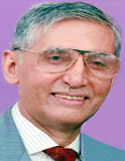 Lt Gen (Retired) Dr BS Malik, PVSM, AVSM
Lt Gen (Retired) Dr BS Malik, PVSM, AVSM
(President)
A graduate of the DSSC (India) and RCDS (UK) with an MSc and PhD from Madras University. He joined 5 Gorkha Rifles (FF) after passing out from NDA in 1962 and was awarded COAS commendation at Manipur in 1975 where he faced insurgency and since then got deeply involved in Small Arms and related issues resulting in selection of his PhD thesis ?Relevance of Military Force in International Affairs?. He went on earn PVSM in 2001 as Chief of Staff Western Command after serving as DG NCC, Joint Secretary (Mil) and Secretary Chiefs of Staff Committee.
He commanded an Independent Division in the Northern Command, a Brigade at the time of the Sino-Indian confrontation at Sumdo Rong -Wangdung incident in 1987-89, which earned him an AVSM in 1990. He was Director Military Operations at the Army Headquarters and Directing Staff at the Higher and the Senior Command at the College of Combat. He was selected to attend the Royal College of Defence Studies (RCDS) at London in 1990 and later served as Military Adviser in the UK from 1991 to 1994.
His writings have been published in various national newspapers, service journals, magazines, websites. His essays have also been published as chapters in edited volumes — one on the “Cost of Conflict Between India and Pakistan” and another on “Weapons of Mass Destruction: Options for India.”
He is a member of the Executive Council of the Institute for Defence Studies and Analyses (IDSA), Governing Council of Netaji Subhash Institute of Management Sciences (NIMS), Indian Pugwash Society, the International Institute for Strategic Studies (IISS) UK and he is also a life member of the United Service Institution (USI) . He is also the President of the Centre for Studies in International Relations and Development (CSIRD) and is working on a project on BIMSTEC and Japan. There have been seven CSIRD publications apart from over thirty papers mostly available on the net .The latest book is on ?Towards BIMSTEC-Japan Comprehensive Economic Cooperation : The Benefits of Moving Together?
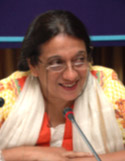
Dr. Anuradha Chenoy (Vice-President)
Dr. Anuradha M. Chenoy is Professor, in the School of International Studies, Jawaharlal Nehru University New Delhi. She works on International Relations, Russia, Central Asia and Gender issues. She has been the Chairperson and Director of the Area Studies Program for Russia and Central Asia; president of the Jawaharlal Nehru University Teachers Association. She has been on the governing bodies of several institutions like the Indian Social Institute, Centre for Education and Communication, New Delhi. She is a Hon. Vice President, Control Arms Foundation of India.
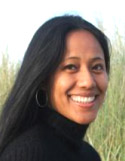
Binalakshmi Nepram
(Secretary General)
Ms Binalakshmi Nepram, born in the state of Manipur located in India’s Northeast region state, bordering Myanmar/Burma. She is a writer-activist and is an emerging determined face and strong voice in the region who is spearheading work on making disarmament a movement and an issue that is meaningful to people’s lives. Ms Nepram has published several articles and papers in both national and international journals on issues relating to armed violence, small arms proliferation, peace processes, women and peace building. She is author of two books, “South Asia’s Fractured Frontier: Armed Conflict, Narcotics and Small Arms Proliferation in India’s Northeast”
and “Meckley”, a historical fiction based on the conflict in Manipur. A new book titled “India and the Arms Trade Treaty” is also being published in April 2008.
In 2004, Ms Nepram co-founded India’s first civil society organization which is working on conventional disarmament issues, namely the Control Arms Foundation of India. And in 2007, in order to help thousands of women who are affected by gun violence in her home-state Manipur, Ms Nepram launched the Manipuri Women Gun Survivor Network. Ms Nepram is also leading the work in India on the issue of anti-personnel landmines, cluster bombs and of international Arms Trade Treaty. She is an active member of International Campaign to Ban Landmines (ICBL), International Action Network on Small Arms (IANSA) and Cluster Munitions Coalition. She has represented Indian civil society in various disarmament meetings held at United Nations in New York.
In 2004, Ms Nepram was awarded a Ploughshares fellowship to work on small arms mitigation in Indo-Myanmar/Burma region. In 2006, Bina was awarded the Dalai Lama Foundation’s WISCOMP Scholar of Peace Award given to women who are working on conflict resolution and peace process and completed a pioneering work on women and micro-disarmament issues.
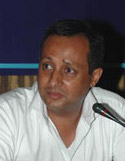
Mr.Riju Raj Jamwal
(Founder-Member)
Mr. Riju Raj Jamwal is a founding member of Control Arms Foundation of India and is an Advocate practicing at Supreme Court of India. He is also a Managing Trustee of Snow Leopard Conservancy India Trust, working to preserve Snow Leopard at Upper Himalayas. He trains and grooms young lawyers with advocacy skills and is also a keen instructor of River Rafting and founding member of Indian Rafting Foundation.
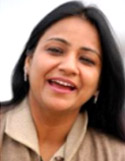
Ashima Kaul
(Founder-Member)
Engaged with peacebuilding initiatives in Jammu and Kashmir for the last ten years, Ashima Kaul, a resident of New Delhi and Kashmiri by origin, is associated with CAFI ever since the idea of bringing the idea of ?arms and their control? into the public domain and consciousness took roots. She firmly believes that peace cannot be built in a vacuum. ?When there are arms floating all around, there is a need to talk about them. Their presence not only jeopardizes the possibility of peace but also endangers the lives of innocents and their access to livelihood?.
A graduate from Women?s College in Jammu, Ashima started freelancing from 1991 for various features services and national dailies. Her interest and focus is primarily to write about women?s issues, to bring their voices directly to the reader. As such an article in 1997 on Kashmiri women?s struggle for creating her own space in the midst of exploding violence led her back to Kashmir Valley which she had left in the mid 80s. That is when her journey for engaging with possibilities of rebuilding human relationships, bringing women?s narratives in the centre stage of Kashmir?s political discourse and reconciliation began.
She is currently a Consultant on Kashmir with Women in Security, Conflict Management and Peace, an initiative of the Foundation for Universal Responsibility and coordinating their Athwaas initiative in Kashmir. As part of Intra-Kashmir dialogue groups Ashima is deeply attached to the idea for regional and sub regional co-operation between the five regions of erstwhile state of Jammu and Kashmir.
As Founder member of Yakjah Reconciliation and Development Network, Ashima is also passionately involved in creating safe spaces for children in Jammu and Kashmir to express their feelings through creative mediums like theater, arts and films.
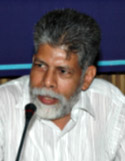
Mr Rappai
(Founder-Member)
Mr MV Rappai is a visiting fellow, Institute of Chinese Studies and founding Board Member, CAFI.



